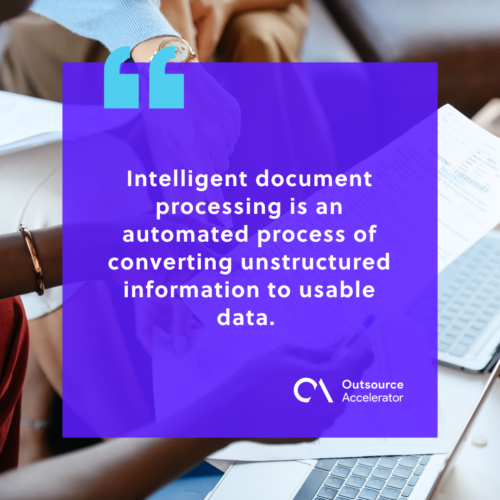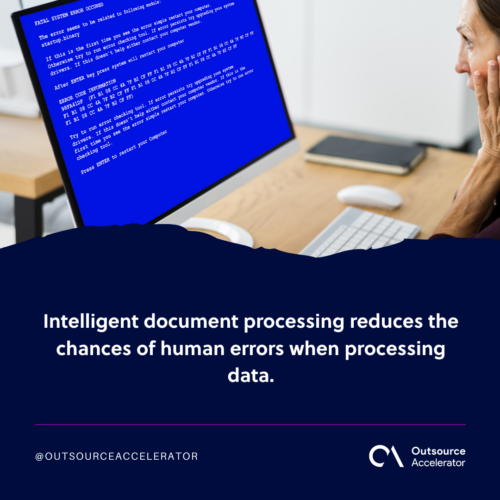Handle your data better with intelligent document processing

The digitization of businesses is inevitable with the increased use of data.
Gartner projected in 2019 that half of the invoice processing will be done without manual intervention in 2025. As global companies venture online to reach more customers, they need to strengthen their ways of handling data and processes.
Document processing is a good way to start transforming your business processes online. But if you want to make your operations more efficient, intelligent document processing can be your companion.
Intelligent document processing defined
Intelligent document processing is an automated process of converting unstructured information to usable data. It automates data gathering from different sources and organizes them for further processing.
Through intelligent document processing, extracting information from large volumes of data can be possible and quicker compared to human extraction.
How intelligent document processing works
Intelligent document processing relies on the following technologies to work properly:
- Computer vision. It derives valuable information from images and videos and takes action based on the information gathered.
- Machine learning. Through machine learning, systems can extract data, identify patterns, and make decisions with little human intervention.
- Deep learning. A machine learning technique, deep learning imitates gaining knowledge through large sets of examples, attaining high accuracy of automation.

It comprises five steps: pre-processing, classification, extraction, validation, and integration.
- Pre-processing. Data is captured from several sources, including scanning, filling out, and typing.
- Classification. Gathered data will then be classified into several categories defined by the processor.
- Extraction. Data is then extracted from several sources, supporting different types of formats.
- Validation. Extracted data is compared and validated against other existing data using machine learning.
- Integration. Once validated, the data will be integrated into other systems for further use.
Manual vs. Intelligent document processing
Manual document processing requires a specialist to encode relevant information from physical and digital resources. It involves copying, typing, and other forms of transferring data into a single database.
In intelligent document processing, meanwhile, converting and processing data can be automated using a single system.
While both methods can benefit businesses in terms of going digital, many companies prefer document processing automated for increased efficiency.
Why businesses use intelligent document processing
Studies from Seagate and IDC predict that worldwide data will exceed 175 zettabytes by 2025. Manual data processing won’t be enough with the increasing volume of data organizations process.
Intelligent document processing is now widely used in various industries for the following reasons:
Reduced errors
Intelligent document processing reduces the chances of human errors when processing data. It can minimize misspells, inaccuracies, or missing information, increasing the value of their processed data.
Increased efficiency
There will be less need for additional staff simply for manual processing. At the same time, existing teams can process more documents in a short period, freeing up time for more complex tasks.
Electronic storage
Processed data are automatically placed in the cloud, whether in a client’s preferred storage or somewhere predefined by the processor. This makes digitization easier for organizations.
Cost efficiency
According to studies, manual processing for an invoice, for instance, costs at least US$10.89 per document.
Intelligent document processing helps businesses cut these costs by at least 60%, helping them save for expansion and other needs.
Security and compliance
Lastly, intelligent document processing helps ensure security and compliance in converting data. It guarantees high accuracy and efficiency in processing data according to GDPR, HIPAA, and other applicable company operation standards.

The best way to handle intelligent document processing
Despite the advantages of intelligent document processing, it still requires a human in the loop in some of its steps to make it work.
The best way to handle intelligent document processing is to complement it with manual processing. Service providers like SixEleven offer the best document processing specialists from offshoring destinations like the Philippines.
Aside from document processing, companies can hire other roles to handle data processing. This includes data entry specialists, encoders, and researchers.







 Independent
Independent




